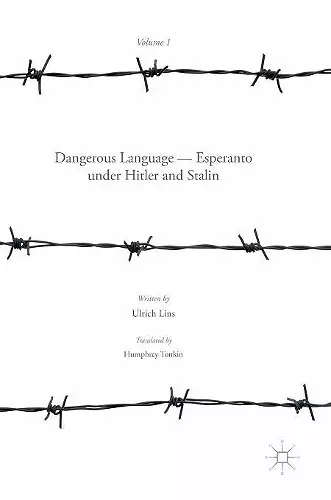Dangerous Language — Esperanto under Hitler and Stalin
Ulrich Lins author Humphrey Tonkin translator
Format:Hardback
Publisher:Palgrave Macmillan
Published:20th Feb '17
Should be back in stock very soon
This hardback is available in another edition too:
- Paperback£99.99(9781349715053)

"The history of Esperanto is usually related by Esperantists, for Esperantists - and in Esperanto. This expanded translation of Ulrich Lins's decades of research into the persecution of Esperantists makes for fascinating reading well beyond that community. Esperanto has no homeland, and for that very reason drew the ire of nationalists and other ideologues from across the political spectrum. This is, in short, nothing less than an alternative history of nationalism." (Michael D. Gordin, Rosengarten Professor of Modern and Contemporary History, Princeton University, US) "This book gives a carefully supported account of a crucial aspect of the Esperanto movement's history, focusing on political repression by totalitarian regimes, especially those of Hitler and Stalin. It also sheds light on opposition elsewhere and is eye-opening for anyone interested in language policy and global communication." (Ulrich Ammon, Emeritus Professor of Germanic Linguistics at Duisberg-Essen University, Germany)
This volume is complemented by the sister volume Dangerous Language - Esperanto and the Decline of Stalinism which offers a concentration on the Cold War history of Esperanto in Eastern Europe.This is Volume 1 of Dangerous Language. This book examines the rise of the international language Esperanto, launched in 1887 as a proposed solution to national conflicts and a path to a more tolerant world. The chapters in this volume chart the emergence of Esperanto as an answer to a widespread democratic desire for direct person-to-person international communication regardless of political boundaries. Its early success was limited, mostly because of the Czarist regime's suspicion of direct communication with foreigners, and, later, similar suspicion by dictatorial regimes generally. As speakers of a "dangerous language," its adepts were harassed and persecuted, especially in Germany and the Soviet Union. This book argues that the fate of Esperanto over the 130 years of its existence serves as a barometer to measure the degree to which regimes tolerate spontaneous personal contact with other countries and allow the pursuit of self-education outside prescribed national or ideological constraints. This book will appeal to a wide readership, including linguists, historians, political scientists and others interested in the history of the twentieth century from the unusual perspective of language. This volume is complemented by the sister volume Dangerous Language - Esperanto and the Decline of Stalinism which offers a concentration on the Cold War history of Esperanto in Eastern Europe.
“Humphrey Tonkin’s English translation of Ulrich Lins’ work … offers a comprehensive analysis of the advent and diffusion of the International Language, charting its development from the embryonic wrangling of creator Lazar Zamenhof amidst the pogroms of the Russian Empire, to the language’s reactionary reception by Nazi and Soviet authorities. … Lins explores the invented language’s history methodically and intimately, resulting in a text that is admirably accessible to the interested layperson and the invested academic alike.” (David Selfe, The Kelvongrove Review, Issue 16, June, 2017)
ISBN: 9781137549167
Dimensions: unknown
Weight: unknown
299 pages
1st ed. 2016